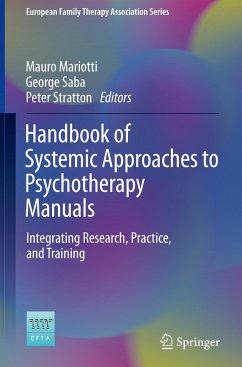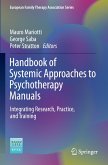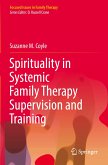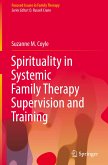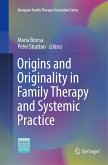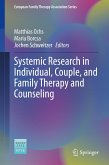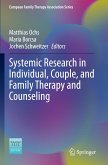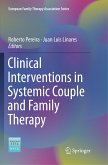Handbook of Systemic Approaches to Psychotherapy Manuals
Integrating Research, Practice, and Training
Herausgegeben:Mariotti, Mauro; Saba, George; Stratton, Peter
Handbook of Systemic Approaches to Psychotherapy Manuals
Integrating Research, Practice, and Training
Herausgegeben:Mariotti, Mauro; Saba, George; Stratton, Peter
- Gebundenes Buch
- Merkliste
- Auf die Merkliste
- Bewerten Bewerten
- Teilen
- Produkt teilen
- Produkterinnerung
- Produkterinnerung
This handbook examines the development and use of manuals to guide and support systemic couples and family therapies. It addresses the process of manualizing, providing a secure base for therapist creativity rather than delineating prescriptive procedures. The volume addresses therapist and trainer concerns by demonstrating the value of sufficiently articulating clinical and teaching models to inform colleagues of what actually occurs during therapy. The book describes the history, value, and controversies of manuals. In addition, it explores issues and experiences in the creation of manuals,…mehr
Andere Kunden interessierten sich auch für
![Handbook of Systemic Approaches to Psychotherapy Manuals Handbook of Systemic Approaches to Psychotherapy Manuals]() Handbook of Systemic Approaches to Psychotherapy Manuals216,99 €
Handbook of Systemic Approaches to Psychotherapy Manuals216,99 €![Spirituality in Systemic Family Therapy Supervision and Training Spirituality in Systemic Family Therapy Supervision and Training]() Suzanne M. CoyleSpirituality in Systemic Family Therapy Supervision and Training116,99 €
Suzanne M. CoyleSpirituality in Systemic Family Therapy Supervision and Training116,99 €![Spirituality in Systemic Family Therapy Supervision and Training Spirituality in Systemic Family Therapy Supervision and Training]() Suzanne M. CoyleSpirituality in Systemic Family Therapy Supervision and Training116,99 €
Suzanne M. CoyleSpirituality in Systemic Family Therapy Supervision and Training116,99 €![Origins and Originality in Family Therapy and Systemic Practice Origins and Originality in Family Therapy and Systemic Practice]() Origins and Originality in Family Therapy and Systemic Practice39,99 €
Origins and Originality in Family Therapy and Systemic Practice39,99 €![Systemic Research in Individual, Couple, and Family Therapy and Counseling Systemic Research in Individual, Couple, and Family Therapy and Counseling]() Systemic Research in Individual, Couple, and Family Therapy and Counseling93,99 €
Systemic Research in Individual, Couple, and Family Therapy and Counseling93,99 €![Systemic Research in Individual, Couple, and Family Therapy and Counseling Systemic Research in Individual, Couple, and Family Therapy and Counseling]() Systemic Research in Individual, Couple, and Family Therapy and Counseling66,99 €
Systemic Research in Individual, Couple, and Family Therapy and Counseling66,99 €![Clinical Interventions in Systemic Couple and Family Therapy Clinical Interventions in Systemic Couple and Family Therapy]() Clinical Interventions in Systemic Couple and Family Therapy66,99 €
Clinical Interventions in Systemic Couple and Family Therapy66,99 €-
-
-
This handbook examines the development and use of manuals to guide and support systemic couples and family therapies. It addresses the process of manualizing, providing a secure base for therapist creativity rather than delineating prescriptive procedures. The volume addresses therapist and trainer concerns by demonstrating the value of sufficiently articulating clinical and teaching models to inform colleagues of what actually occurs during therapy. The book describes the history, value, and controversies of manuals. In addition, it explores issues and experiences in the creation of manuals, identifies research issues related to the use and evaluation of manuals, and addresses training as a context for the application of treatment manuals.
Key areas of coverage include:
Reports of experiences with major, internationally established manuals, formulations of innovative practices by their developers, and specifications of training programs.Discussion of the various formats of manuals, demonstrating their benefit and transportability across different contexts.Surveys of a broad selection of manuals, creating a flexible and diversified concept of what forms manuals may take.Essential guidance for using manuals, which is an indispensable step for the field to progress and to claim to health resource commissioning, governments and insurance agencies that the systemic practice is evidence based and effective.
The Handbook of Systemic Approaches to Psychotherapy Manuals is an essential resource for researchers, professors, and graduate students as well as clinicians and related therapists and professionals in clinical psychology, family studies, public health, social work, psychotherapy, child and adolescent psychology and all interrelated disciplines.
Key areas of coverage include:
Reports of experiences with major, internationally established manuals, formulations of innovative practices by their developers, and specifications of training programs.Discussion of the various formats of manuals, demonstrating their benefit and transportability across different contexts.Surveys of a broad selection of manuals, creating a flexible and diversified concept of what forms manuals may take.Essential guidance for using manuals, which is an indispensable step for the field to progress and to claim to health resource commissioning, governments and insurance agencies that the systemic practice is evidence based and effective.
The Handbook of Systemic Approaches to Psychotherapy Manuals is an essential resource for researchers, professors, and graduate students as well as clinicians and related therapists and professionals in clinical psychology, family studies, public health, social work, psychotherapy, child and adolescent psychology and all interrelated disciplines.
Produktdetails
- Produktdetails
- European Family Therapy Association Series
- Verlag: Springer / Springer International Publishing / Springer, Berlin
- Artikelnr. des Verlages: 978-3-030-73639-2
- 1st edition 2021
- Seitenzahl: 664
- Erscheinungstermin: 18. Februar 2022
- Englisch
- Abmessung: 241mm x 160mm x 41mm
- Gewicht: 1150g
- ISBN-13: 9783030736392
- ISBN-10: 3030736393
- Artikelnr.: 61380235
- Herstellerkennzeichnung Die Herstellerinformationen sind derzeit nicht verfügbar.
- European Family Therapy Association Series
- Verlag: Springer / Springer International Publishing / Springer, Berlin
- Artikelnr. des Verlages: 978-3-030-73639-2
- 1st edition 2021
- Seitenzahl: 664
- Erscheinungstermin: 18. Februar 2022
- Englisch
- Abmessung: 241mm x 160mm x 41mm
- Gewicht: 1150g
- ISBN-13: 9783030736392
- ISBN-10: 3030736393
- Artikelnr.: 61380235
- Herstellerkennzeichnung Die Herstellerinformationen sind derzeit nicht verfügbar.
Mauro Mariotti, M.D., is a child psychiatrist, psychiatrist, and psychotherapist. He is the former Director of the Departments of Child and Maternal Health of Reggio Emilia and Child Psychiatry of Modena. He was a professor at University of Modena and Reggio Emilia. He is the Director of Institute of Systemic and Relational Psychotherapy (ISCRA) of Modena and Cesena. He founded the international association of systemic mediation. He is the past president of Italians society of research and systemic therapy, founded by Luigi Boscolo and Gianfranco cecchin. He is the author and editor of 12 books on psychotherapy, child psychology and psychiatry, and family and founder of the Journal Maieutica. He is a board member of the European Family Therapy Association. He was also a member of the Italian Society of Psychology and Relational Psychotherapy (SIPPR) research board for which he served as coordinator and as Secretary for 8 years during the Presidency of Gianfranco Cecchin.Heserved as secretary also for the European Society of Family Mediation and he is active as court expert on children and family matters. George Saba, Ph.D., is a systemic family therapist and a clinical and counseling psychologist with a broad scope of research, training, and clinical interests in systemic and relational care. He has been a behavioral science faculty member in the Department of Family and Community Medicine at the University of California, San Francisco, since 1983. For the past 30 years, he has served as the Director of Behavioral Sciences and the Associate Program Director at the Family and Community Medicine Residency. His clinical research has involved evaluating a systemic model of therapy for bulimia, substance use, chronic illness, and a relational oriented family medicine. His communication research has explored the physician-patient-family interaction in primary care. His educational research has included evaluating training models for systemic physicians, curriculum development and faculty development. He was the founding Associate Editor of the Journal of Family Psychology. He has developed a manual for the training of systemic physicians in a three-year family medicine residency program. He has served on numerous editorial boards, including Families, Systems and Health, Zeitschrifft Fur Systemische Therapie; Journal of Strategic and Systemic Therapies, and Journal of Families and Addictions and is an ad hoc reviewer for multiple journals. He was the lead editor of Minorities and Family Therapy, which was published as a special journal issue, a hardcover book, and a classroom text. He is a member of the UCSF Academy of Medical Educators. He was awarded Endowed Chair of Community Medicine from 2006-2016; since 2016 he has held the Endowed Chair in Teaching Primary Care. He received UCSF's Excellence and Innovation in Graduate Medical Education in 2018 for his lifetime's work in the education of health care professionals. Peter Stratton, BSc, Ph.D., Dip Psychotherapy, FBPsS., is a systemic family therapist and developmental psychologist with broad research interests and involvement in statutory processes that affect families. His research includes development of an outcome measure for families in therapy (the SCORE project); the effects of basing training on concepts of active learning and the dialogical construction of self; the relationships of humour and creativity during psychotherapy; attributional analyses of family causal beliefs and blaming; public attitudes to terrorism by combining attributional coding with metaphor analysis. Joint Editor of Human Systems: The Journal of Therapy, Consultation and Training; Joint Editor of the EFTA-Springer Book series; Chair of EFTA Research Committee and Relate Research Advisory Group. Recently: Academic and Research Development Officer for the Association for Family Therapy; Chair of the UKCP ResearchFaculty and a member of the CAMHS Outcomes and Evaluations, the CYP-IAPT Critical Friends. Founding Director of Leeds Family Therapy & Research Centre and Managing Director of The Psychology Business Ltd. He led the teams that developed the Leeds Attributional Coding System (LACS) and The Leeds Systemic Family Therapy Manual and chaired the UK Skills for Health team that developed the specification of the competences of systemic psychotherapists. In 2013, his contributions to psychotherapy research were recognised with an award by EFTA and an Honorary Fellowship of UKCP.
Chapter 1. Introduction.- Chapter 2. Towards a Truly Systemic Account of the Present and Future of Manualisation.- Chapter 3. Another Loop of the Spiral: A Re-examination of 18 Manualized Prescriptions from 1978.- Part 1. Issues and Experiences in the Creation of Manuals.- Chapter 4. Four Advances That Can Enhance Treatment Manual Development.- Chapter 5. Six Different Approaches to Manualisation: Research Based Projects of the Leeds Family Therapy & Research Centre.- Chapter 6. Manualizing Human Systems Therapy: Towards a Few Session Therapy.- Chapter 7. Manualizing the Therapeutic Process in Systemic Therapy: From the Construction of the Hypothesis to the Assessment of Change.- Chapter 8. Family Maps and Systemic Setting of Therapeutic Work with Families.- Chapter 9. A Theoretical Model of a Systemic Therapy Clinic.- Chapter 10. Systemic Family Therapy in Child and Adolescent Mental Health Care: Map of Therapeutic Competences.- Part 2. Research Issues in the Use and Evaluation of Manuals.- Chapter 11. An Integrative Approach to Systemic Therapy.- Chapter 12. The Story of the Digital, Analogic, Narrative (DAN) Model: From a Tool to Help Young Families to Raise Children to a General Model for Systemic Therapy.- Chapter 13. The Manualisation of Research at ISCRA Institute.- Chapter 14. The DAN Model in Practice: Transformations and Enhancement of Resiliency in a Nonclinical Parental Couple - A Case Report.- Chapter 15. Taking Care of Adoption (TCA): Development of a Treatment Manual for Adoptive Families.- Chapter 16. Manualized Family Therapy in a Controlled Study on Childhood Depression: Therapist and Supervisor Reflections on the Use of the Manual.- Chapter 17. International Practitioner Contributions to Manualising the SCORE for Improving and Measuring Systemic Therapy.- Chapter 18. Issues in Conducting a Rigorous Research Process for Creating a Treatment Manual.- Part 3: Manual Use in Clinical Practice.- Chapter 19. Image, Family, and Clinical Practice.- Chapter 20. The Maudsley Approach in Single and Multifamily Therapy.- Chapter 21. Manualising a Semantic Approach to Systemic Therapy with Anorexic Girls and Their Families. What Are the Advantages and Risks?.- Chapter 22. Floating Therapies and Working on the Self: A Contribution to the Milan Approach.- Chapter 23. Triangular Mirroring in Child Psychotherapy: A Procedure to Evaluate the First Session.- Chapter 24. A Model to Overcome the Couple Cross Demonization with Conflictual Divorced Couples.- Chapter 25. Basic Model of a Couple's Crisis. A Useful Tool in Couples' Therapy.- Chapter 26. Marte Meo and Coordination Meetings: A Systemic, School-based Intervention.- Part 4: Training as a Basis for Development of Manuals and a Context for Their Application.- Chapter 27. A Manualized Systemic Family Therapy Training Program.- Chapter 28. Manualising the Sacred: Educating Systemic Physicians to Care for Families of the Poor.- Chapter 29. Systemic Therapy Training in Practice: Changing the Trainees' Epistemology.- Chapter 30. Trainee Focused Training: A Second Order Approach in the Making of Therapists.- Chapter 31. Family Therapy Training in the Greek Public Sector: An Experiential Learning Process Through Personal and Professional Development.- Chapter 32. From Neurons to Neighbourhoods: Developing a Treatment Plan Manual for the Enriched Systemic Psychotherapy Perspective SANE (System Attachment Narrative Encephalon®).- Chapter 33. The Exeter Couples Therapy Manual: Training for a Systemic Specialism Within Professions.- Chapter 34. Future Direction of Manualisation of Systemic Therapies.
Chapter 1. Introduction.- Chapter 2. Towards a Truly Systemic Account of the Present and Future of Manualisation.- Chapter 3. Another Loop of the Spiral: A Re-examination of 18 Manualized Prescriptions from 1978.- Part 1. Issues and Experiences in the Creation of Manuals.- Chapter 4. Four Advances That Can Enhance Treatment Manual Development.- Chapter 5. Six Different Approaches to Manualisation: Research Based Projects of the Leeds Family Therapy & Research Centre.- Chapter 6. Manualizing Human Systems Therapy: Towards a Few Session Therapy.- Chapter 7. Manualizing the Therapeutic Process in Systemic Therapy: From the Construction of the Hypothesis to the Assessment of Change.- Chapter 8. Family Maps and Systemic Setting of Therapeutic Work with Families.- Chapter 9. A Theoretical Model of a Systemic Therapy Clinic.- Chapter 10. Systemic Family Therapy in Child and Adolescent Mental Health Care: Map of Therapeutic Competences.- Part 2. Research Issues in the Use and Evaluation of Manuals.- Chapter 11. An Integrative Approach to Systemic Therapy.- Chapter 12. The Story of the Digital, Analogic, Narrative (DAN) Model: From a Tool to Help Young Families to Raise Children to a General Model for Systemic Therapy.- Chapter 13. The Manualisation of Research at ISCRA Institute.- Chapter 14. The DAN Model in Practice: Transformations and Enhancement of Resiliency in a Nonclinical Parental Couple - A Case Report.- Chapter 15. Taking Care of Adoption (TCA): Development of a Treatment Manual for Adoptive Families.- Chapter 16. Manualized Family Therapy in a Controlled Study on Childhood Depression: Therapist and Supervisor Reflections on the Use of the Manual.- Chapter 17. International Practitioner Contributions to Manualising the SCORE for Improving and Measuring Systemic Therapy.- Chapter 18. Issues in Conducting a Rigorous Research Process for Creating a Treatment Manual.- Part 3: Manual Use in Clinical Practice.- Chapter 19. Image, Family, and Clinical Practice.- Chapter 20. The Maudsley Approach in Single and Multifamily Therapy.- Chapter 21. Manualising a Semantic Approach to Systemic Therapy with Anorexic Girls and Their Families. What Are the Advantages and Risks?.- Chapter 22. Floating Therapies and Working on the Self: A Contribution to the Milan Approach.- Chapter 23. Triangular Mirroring in Child Psychotherapy: A Procedure to Evaluate the First Session.- Chapter 24. A Model to Overcome the Couple Cross Demonization with Conflictual Divorced Couples.- Chapter 25. Basic Model of a Couple's Crisis. A Useful Tool in Couples' Therapy.- Chapter 26. Marte Meo and Coordination Meetings: A Systemic, School-based Intervention.- Part 4: Training as a Basis for Development of Manuals and a Context for Their Application.- Chapter 27. A Manualized Systemic Family Therapy Training Program.- Chapter 28. Manualising the Sacred: Educating Systemic Physicians to Care for Families of the Poor.- Chapter 29. Systemic Therapy Training in Practice: Changing the Trainees' Epistemology.- Chapter 30. Trainee Focused Training: A Second Order Approach in the Making of Therapists.- Chapter 31. Family Therapy Training in the Greek Public Sector: An Experiential Learning Process Through Personal and Professional Development.- Chapter 32. From Neurons to Neighbourhoods: Developing a Treatment Plan Manual for the Enriched Systemic Psychotherapy Perspective SANE (System Attachment Narrative Encephalon®).- Chapter 33. The Exeter Couples Therapy Manual: Training for a Systemic Specialism Within Professions.- Chapter 34. Future Direction of Manualisation of Systemic Therapies.

